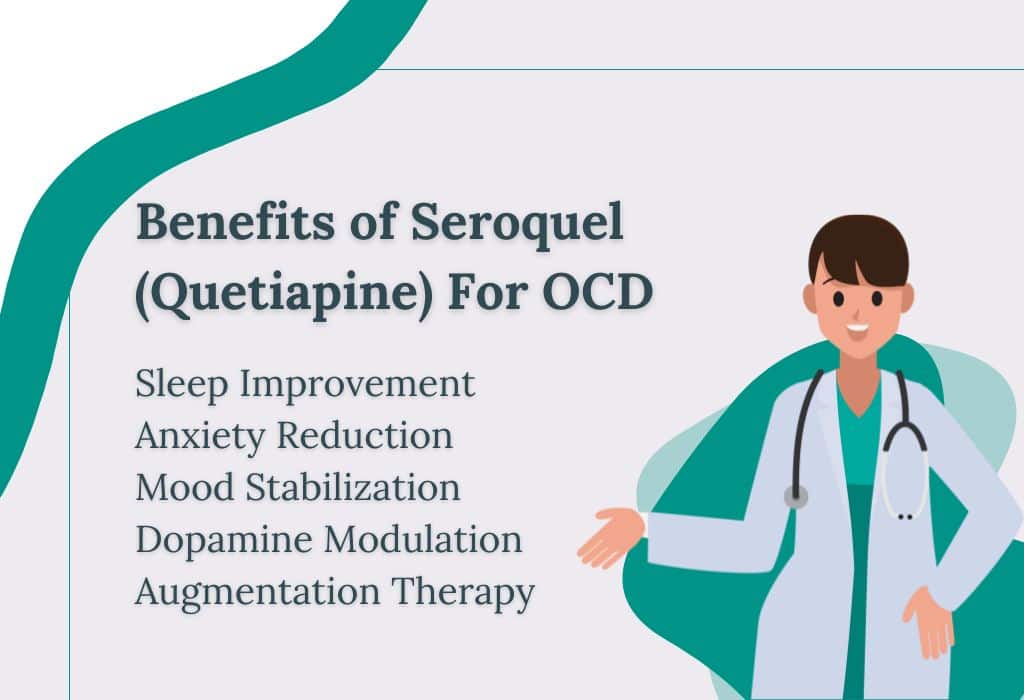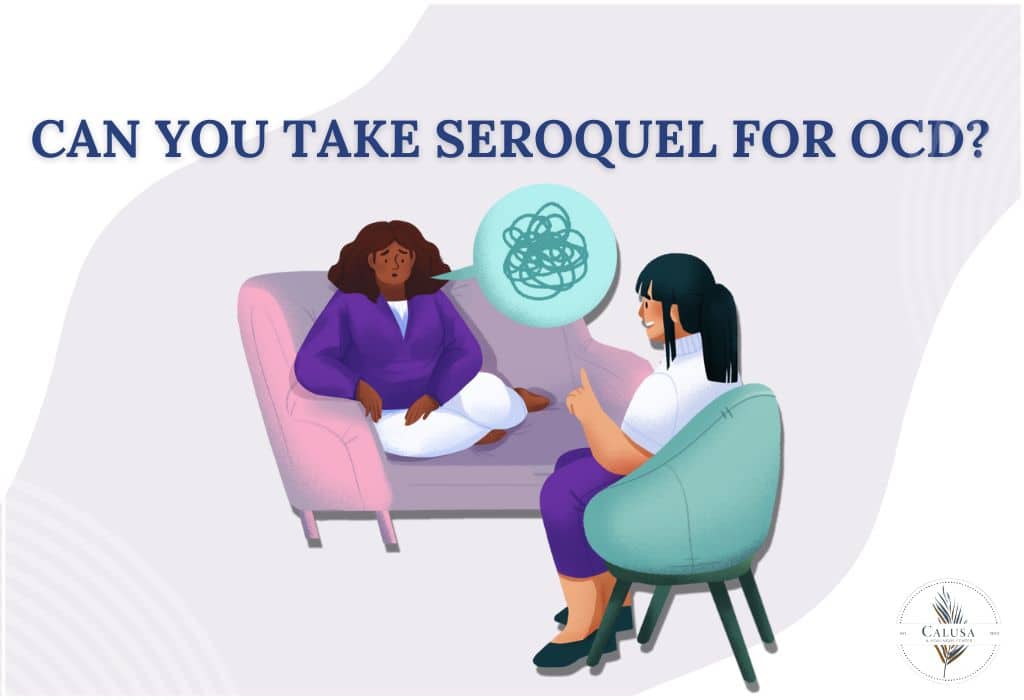This article will explain what Seroquel is and whether it could make a difference for you. It’s about giving you the info you need to make decisions about your health.
So, could Seroquel be the answer to easing your OCD? Let’s find out together.
If OCD is impacting your daily life, know that there’s a way forward!
The time it takes for Seroquel (quetiapine) to work for OCD can vary depending on several factors, including the individual’s overall health, the severity of their OCD symptoms, and how they respond to the medication. Seroquel is not a first-line treatment for OCD, and its use for OCD is considered off-label, meaning regulatory agencies do not specifically approve it for this purpose.
In general, it may take several weeks to notice significant improvements in OCD symptoms after starting Seroquel. However, some individuals may experience benefits sooner, while others may require a longer duration of treatment to see noticeable changes.
It’s essential to follow your healthcare provider’s guidance regarding the dosage and duration of Seroquel treatment for OCD. They will monitor your progress and adjust your treatment plan to ensure the best possible outcome.
Keep in mind that Seroquel should only be used for OCD under the supervision of a qualified healthcare professional. It should be part of a comprehensive treatment approach that may include therapy, lifestyle modifications, and other medications if necessary. If you have any questions or concerns about Seroquel or its effectiveness for OCD, consult with your healthcare provider for personalized advice and recommendations.
How long does it take for Seroquel to work for OCD?
While Seroquel (quetiapine) is sometimes prescribed for Obsessive-Compulsive Disorder (OCD), it’s important to understand its effectiveness and timeline:
- Limited Evidence: Extensive research primarily supports the use of Selective Serotonin Reuptake Inhibitors (SSRIs) as the first-line treatment for OCD. Seroquel is typically used as an augmentation, meaning it’s added to an SSRI regimen when the SSRI alone isn’t sufficient.
- Gradual Improvement: For both SSRIs and Seroquel, it can take weeks to months to experience the full benefits of treatment. You might notice some improvement in symptoms like anxiety or sleep within a few weeks, but significant reductions in OCD compulsions and obsessions may take 2-3 months to become evident.
Here’s what to remember:
- Consult a mental health professional: Never self-medicate with Seroquel or any other medication. A psychiatrist or therapist can assess your specific needs and determine the best treatment approach for your OCD.
- Individual Response: The effectiveness and timeline for medication to work can vary depending on the severity of your OCD and your individual response.
- Open Communication: Maintain open communication with your doctor about your progress and any side effects you experience. They can adjust the medication or treatment plan as needed.
Research and evidence supporting Seroquel (Quetiapine) for OCD treatment
Seroquel (quetiapine), an atypical antipsychotic medication, has been explored as a potential treatment option for OCD, particularly in cases where first-line treatments haven’t been successful. While there’s some evidence for its benefit, the picture is unclear.
Here’s a breakdown of the research:
Limited Evidence for First-Line Treatment:
- SSRIs as First Choice: Extensive research supports Selective Serotonin Reuptake Inhibitors (SSRIs) as the first-line treatment for OCD. They work by increasing serotonin levels in the brain, which regulates mood and behavior.
Seroquel as Augmentation Therapy:
- Potential Benefits: Some studies suggest that adding Seroquel to an SSRI regimen (augmentation) might be beneficial for patients who don’t respond adequately to SSRIs alone. These studies often involve patients with treatment-resistant OCD, meaning they haven’t seen significant improvement with other medications.
- Mixed Results: Research on the effectiveness of Seroquel for OCD augmentation has yielded mixed results. Some studies show improvement in OCD symptoms, while others don’t show a statistically significant difference compared to placebo.
Factors Affecting Certainty:
- Limited Sample Sizes: Many studies investigating Seroquel for OCD have involved relatively small sample sizes, making it difficult to draw definitive conclusions.
- Heterogeneity: Studies may use different methodologies and criteria for measuring OCD severity and treatment response, making it challenging to compare results directly.
- Need for More Research: Larger, well-designed studies are needed to fully understand Seroquel’s role in OCD treatment and to determine the optimal dosage and duration of treatment.
Dosage and administration of Seroquel for OCD
The dosage and administration of Seroquel (quetiapine) for OCD can vary based on individual factors such as age, medical history, and severity of symptoms. It’s crucial to follow your healthcare provider’s instructions carefully and never adjust the dosage independently. Here are some general guidelines:
- Starting Dosage: Typically, the initial dosage of Seroquel for OCD ranges from 25 mg to 50 mg per day, taken orally. Your doctor may start you on a lower dose and gradually increase it to achieve the desired therapeutic effect.
- Maintenance Dosage: The maintenance dosage of Seroquel for OCD can range from 150 mg to 300 mg per day, divided into two or three doses. Your doctor will determine the optimal maintenance dose based on your response to the medication and any side effects experienced.
- Administration: Seroquel tablets should be taken by mouth with a full glass of water. It can be taken with or without food, but taking it with food may help reduce the risk of stomach upset. Follow the prescribed dosing schedule provided by your doctor.
- Regular Monitoring: Your doctor will monitor your progress regularly to assess the effectiveness of Seroquel in managing your OCD symptoms. Attending all follow-up appointments and reporting any changes or concerns to your healthcare provider is essential.
- Adjustments: Dosage adjustments may be necessary based on your individual response to Seroquel and any side effects experienced. Only increase or decrease the dosage after consulting your doctor.
- Duration of Treatment: The duration of Seroquel treatment for OCD is typically long-term, as OCD is a chronic condition. Your doctor will discuss the expected duration of treatment and any potential risks or benefits associated with the long-term use of Seroquel.
Always consult your healthcare provider for personalized dosage recommendations and guidance on the safe and effective use of Seroquel for OCD. Follow their instructions carefully to optimize the therapeutic benefits and minimize the risk of adverse effects.
Important Reminders:
- Never Self-Medicate: Seroquel is a powerful medication with potential side effects. It should only be taken under the supervision of a qualified healthcare professional.
- Consult a Doctor: If you have OCD and are wondering if Seroquel could be a treatment option, discuss it with a psychiatrist or therapist. They can assess your specific needs and determine the best approach for managing your OCD.
- Open Communication: Maintain open communication with your doctor about your progress and any side effects you experience. They can adjust the medication or treatment plan as needed.
Your Journey to a Brighter Tomorrow
Seroquel (quetiapine) is an atypical antipsychotic medication. It also has a use in conjunction with other treatments for OCD. While it’s not a first-line treatment, it can be helpful in certain situations. Let’s explore the potential benefits and side effects of Seroquel for OCD patients.
Benefits of Seroquel (quetiapine) in OCD patients:

- Reduction of OCD Symptoms: Seroquel has shown promise in reducing obsessive-compulsive disorder (OCD) symptoms, including intrusive thoughts and repetitive behaviors.
- Alternative Treatment Option: For individuals who do not respond well to traditional OCD treatments like cognitive-behavioral therapy (CBT) or selective serotonin reuptake inhibitors (SSRIs), Seroquel provides an alternative medication approach.
- Improved Quality of Life: By effectively managing OCD symptoms, Seroquel can improve patients’ overall quality of life, allowing them to engage in daily activities more comfortably.
Potential Side Effects of Seroquel in OCD Patients:
- Sedation: Seroquel may cause drowsiness or sedation, especially when starting the medication or adjusting the dosage. Patients should use caution when operating machinery or driving until they know how Seroquel affects them.
- Weight Gain: Some patients may experience weight gain while taking Seroquel. Monitoring weight regularly and discussing any concerns with your healthcare provider is essential.
- Metabolic Changes: Seroquel can lead to metabolic changes such as elevated blood sugar levels and lipid abnormalities. Regular monitoring of metabolic parameters is recommended during treatment.
- Orthostatic Hypotension: Seroquel may cause a drop in blood pressure when standing up suddenly, leading to dizziness or fainting. Patients should rise slowly from a sitting or lying position to minimize this risk.
- Extrapyramidal Symptoms: In rare cases, Seroquel may cause extrapyramidal symptoms such as tremors, muscle stiffness, or involuntary movements. Promptly inform your doctor if you experience any of these symptoms.
Patients need to weigh the potential benefits of Seroquel in managing OCD symptoms against the risk of side effects. Close monitoring by a healthcare provider can help mitigate risks and optimize the therapeutic effects of Seroquel for OCD patients.
The Final Say
Seroquel (quetiapine) presents itself as a promising and effective treatment option for individuals struggling with obsessive-compulsive disorder (OCD). With its ability to reduce OCD symptoms and provide an alternative for those who do not respond well to traditional therapies, Seroquel offers hope and improved quality of life for OCD patients.
However, it’s crucial to weigh the potential benefits against the risk of side effects and ensure close monitoring by a qualified healthcare professional throughout the treatment journey.
To connect with us at Calusa and learn more about how Seroquel can benefit you or your loved ones dealing with OCD, reach out to us today. Our dedicated team is here to provide support, answer your questions, and guide you through your treatment journey. Contact us at 866.939.6292 or visit our website https://calusarecovery.com/ to get started.










